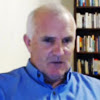
Bede Clifford
This is the first of an ongoing series written by Bede Clifford. Bede is a student of Swamini Atmaprakasananda. He comes to Vedanta from a background of Theology, Philosophy, Sociology & Psychology.
Click here to view Bede Clifford’s YouTube channel
To start at the beginning of this series, click here.
Being a Student of Vedanta Part 2
When I first meet up with Swamini Atmaprakasananda on skype I asked her why there was suffering. I didn’t say “why am I suffering” that was too close. I wanted to know what she would say. I had never talked to a guru before and it was embarrassing to ask. In the past I had rubbished people who needed them. It seemed to me like weakness. Swamini said the following. “the reason people suffer is that that are dependant of people and things for their happiness”. Because I had lost most of the things I depended on for my happiness and was suffering extremely as a result what she said made complete sense. She also said in this first conversation “people and things never hurt us they are just instrumental in revealing the pain that is already with us. This understanding is the beginning of emotional maturity”.
I got the point very clearly. I did not like it but I could see that what she was saying was that people and events which SEEM to be the cause of our misery and unhappiness. I mean the experience of being hurt by events and others seems to be convincingly real. But here she was saying that MY DEPENDENCE ON PEOPLE AND EXTERNAL CONDITIONS FOR MY HAPPINESS WAS MY PRIMARY PROBLEM. So here I was with my atrophied discrimination giving consent to what she was saying but in terms of experience and a very convincing experience at that, what she was saying did not seem to true. This was the first time and no means the last that the standpoint of the scriptures was in direct opposition to my own standpoint which is based on my experience which APPEARS so true. I mean I had a whole life time of experiencing the absence of objects CAUSING me pain and a whole lifetime of the presence of objects CAUSING me pain. Swamini was making it very clear that blaming was not only futile but incorrect. What was causing my pain was my dependence.
Until I met this Vedanta teacher I lived entirely in the context of a world of objects (people and conditions) that were giving me happiness or taking it away. All I wanted was the happenings of the universe to line up with what I wanted so I could be happy. Because if it did not I was very unhappy. I also knew that the fault lay with the universe not me. I looked at the world and drew a big line down the middle. I put all the things that MADE me happy on the left hand side and put all the things that MADE me unhappy on the right hand side. Then I built my life around staying on the left hand side because my happiness depended on staying on that side. This context WITHIN which I lived determined entirely how I lived in the world and what everything that happened meant to me. My way of seeing was determined by this context and the way I lived in my world came out of this way of seeing. My living in my world was my way of seeing the world in action. Any efforts to improve myself was like rearranging the chairs on the Titanic. It seemed like I was doing something but it was all done within the same context that was the problem. So the same old suffering in new forms kept on appearing no matter what I did.
“This is what we call samsara- the dependence upon another person, another situation, for your own sense of well-being” Swami Dayananda.
Before my conversation with Swamini I thought like the Buddhists that life was samasra. Life was suffering. Something was wrong with life because it was suffering. From appearances this seemed to be very true. But this was not was being said here. This teacher was saying that my dependence on objects was MY problem. This made me wrong of course but at the same time I knew that if the problem lay with me and not the world maybe something radical (going to the root) might be able to take place in my life. I felt I was beginning something. 8I just didn’t know what it was. Even though she was saying was very tough she was very kind at the same time which enabled me to take on board what she was saying. Something within me knew that the problem lay with me in spite of all the “evidence” to the contrary.
